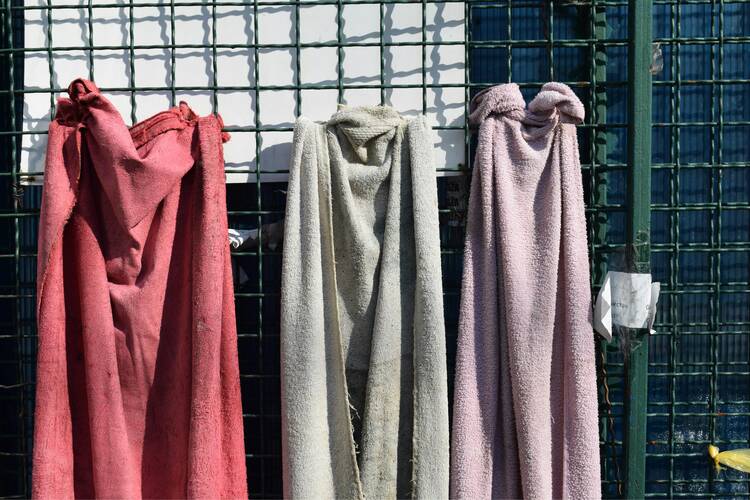A Homily for the Sixteenth Sunday in Ordinary Time
Readings: Genesis 18:1-10a Colossians 1:24-28 Luke 10:38-42
We are not taught to make-believe. It comes naturally.
As a kid, I often flew through the air with Randy, an older boy from across the alley. Or so it seemed when we tied towels around our necks and fought for truth, justice and the American way. Randy even fashioned a Captain America shield using a round board with red, white and blue duct tape. I could not do that, lack of duct tape notwithstanding. I have never been a Marvel man; I am as devoted to DC comics as I am to Catholicism.
I later became an astronaut, but, as I could not fit into the Gemini space capsule, I squeezed my kid sister into the clothes dryer. Sadly, the countdown had to be scrubbed because the chimp I was sending into orbit was a bawl baby.
We are not taught make-believe. It comes naturally.
Do we ever outgrow it?
Or does it retreat into the hidden veins of self? Do we not—all of us—carry about a make-believe image of the self?
It is not who we really are. We know that. But someday soon it will be—so we think—as soon as we get our act together. Then we will be the one whom everyone can count upon, the one who never wavers, the one everyone so rightly loves.
We know there is a gap between what is and what should be. We aim to close it any day now. Just not today.
Between the idea
And the reality
Between the motion
And the act
Falls the Shadow
Between the conception
And the creation
Between the emotion
And the response
Falls the Shadow.
As T. S. Eliot put it in his poem “The Hollow Men”:
We are the hollow men
We are the stuffed men
Leaning together
Headpiece filled with straw.
But of course, being the hollow ones, scarecrows who pretend to be what they are not, we become all too comfortable with our charades. We even develop ways of speaking and acting that mutually support the unreal selves we are.
We whisper together
Are quiet and meaningless
As wind in dry grass
Or rats’ feet over broken glass
In our dry cellar.
Shape without form, shade without colour,
Paralyzed force, gesture without motion.
Eliot’s is a sad take on authenticity!
St. Paul had something better to offer. He told his flock that they could become who they were always meant to be. Make-believe could give way to reality.
But now it has been manifested to his holy ones,
to whom God chose to make known the riches of the glory
of this mystery among the Gentiles;
it is Christ in you, the hope for glory.
It is he whom we proclaim,
admonishing everyone and teaching everyone with all wisdom,
that we may present everyone perfect in Christ (Col 1:27-28).
To be baptized into Christ is to begin the search for self, who we were meant to be in the eyes of God, eyes that only see the truth. Who will we be when we become “perfect in Christ?” For most, it is a long journey because:
This is a dead land
This is cactus land
Here the stone images
Are raised, here they receive
The supplication of a dead man’s hand
Under the twinkle of a fading star.
But being baptized into living water, we can walk through deserts of deception, shedding slowly—and sometimes only reluctantly—the self-fashioned, self-inflicted masks of our make-believe.
Catherine of Siena speaks for many a saint when she links humility and charity. To know our own poverty—who we truly are—is to know the love of God, the “True Love” who loves us through this humility into the self we were always meant to be:
No virtue can have life in it except from charity, and charity is nursed and mothered by humility. You will find humility in the knowledge of yourself when you see that even your own existence comes not from yourself but from me, for I loved you before you came into being. And in my unspeakable love for you I willed to create you anew in grace. So I washed you and made you a new creation in the blood that my only-begotten Son poured out with such burning love (The Dialogue, 4).
T. S. Eliot’s poem “The Hollow Men” is not without hope, not without Christ.
Sightless, unless
The eyes reappear
As the perpetual star
Multifoliate rose
Of death’s twilight kingdom
The hope only
Of empty men.
Christ in his kingdom is that multifoliate rose, the one Dante saw at the end of his own long journey into self. Each petal of the Christ Rose is a soul redeemed, a soul that shed make-believe to become what it was always meant to be when it became “perfect in Christ.”
But how? How does one set aside pretense for truth, when the semblance that enslaves us was crafted by the one most suited to hold us back: our unredeemed, our make-believe selves?
You must entertain angels! Sit with them, talk with them. Like Mary you must learn to contemplate. Sit at the feet of Jesus. At first, your self-chatter will be mostly make-believe, much that just does not matter. But in his steady, loving gaze, you will find yourself. In the silence, you will become who you were meant to be. For prayer is not about making the world conform to our make-believe. Its task is to make us “perfect in Christ.”








